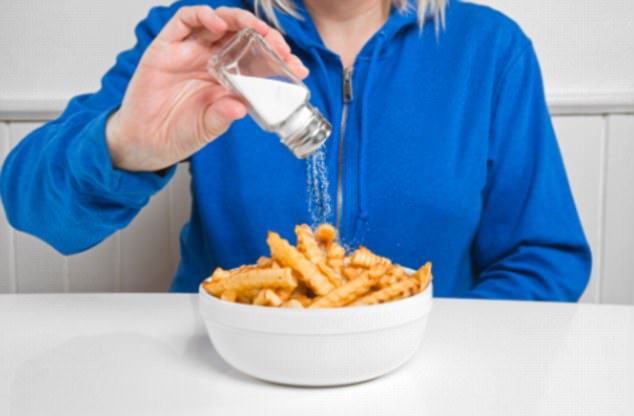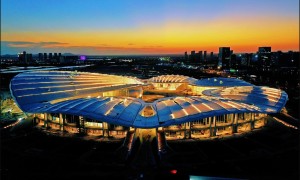导读:通常人们都以为吃得咸会导致大量喝水,吃得太咸甚至会导致脱水。然而最新研究表明,这根本就是无稽之谈。

We all know that salty foods make you crave a drink.But is that really true? According to a landmark scientific study, it’s not.
众所周知,咸的食物会让你觉得口渴。但这是真的吗?根据一项具有里程碑意义的科学研究表明,其实并非如此。
An international group of researchers tested the theory by monitoring the salt intake and hydrating levels in cosmonauts during a year-long simulated mission to Mars.
一个国际研究小组在俄国宇航员长达一年的模拟火星任务中,通过监测盐分摄入量和体内水分保持情况来证实了这一理论。
They concluded that the adage is nothing more than an old wives’ tale.In fact, they found intensely savory food quelled thirst, making cosmonauts more hydrated and energetic.
他们最终得出结论,原先的说法根本就是无稽之谈。事实上,他们发现咸味的食物让俄国宇航员们不那么口渴,身体水分更加充足并且精力更加充沛。
The study - the first long-term research to analyze the link between diet and drink habits - will transform the way scientists look at urea in the body. once seen as simply a wasteful protein excreted in urine, it may actually hold value.
该研究作为第一个分析日常饮食和饮水习惯的长期研究,将改变科学家们对于人体内尿素的看法。过去我们简单地认为尿液中排泄的蛋白质不过是一种浪费,然而实际上可能是有用的。
The decision to test the theory in space voyagers had two benefits.
决定用宇航员来测试该结论有两个好处。
Firstly, it is useful information for cosmonauts.Hydration is crucial on a long space voyage, where food and drink is limited.
首先,对俄国宇航员来说该信息是有用的。在长期的太空旅行中,食物和饮品都是有限的,因此体内水分的保持是至关重要的。
In order to effectively organize their food stock, and keep astronauts healthy, space teams need to accurately calculate the relationship between salt and liquid intake.
为了有效的管理食物库存,维持宇航员的健康,空间小组需要精确计算盐分和液体摄入量之间的关系。
Secondly, it provided a perfectly controlled environment.
其次,它提供了一种完美控制的环境。
Every aspect of a person’s nutrition, water consumption, and salt intake could be controlled and measured during the simulation.
在模拟期间,一个人营养、水分消耗和盐分摄入的每一方面都应当控制和测量。
The subjects were two groups of 10 male volunteers sealed into a mock spaceship for two simulated flights to Mars.
受试者为两组,分别有10个男性志愿者,他们被封闭在两趟模拟飞往火星的飞船上。
The first group was examined for 105 days; the second over 205 days.
第一组的测试时间为105天;第二组的测试时间超过205天。
They had identical diets except that over periods lasting several weeks, they were given three different levels of salt in their food.
他们的饮食都是一样的,只是在几周后,给他们提供的食物分三种不同程度的咸味。
The results confirmed that eating more salt led to a higher salt content in urine - no surprise there. Nor was there any surprise in a correlation between amounts of salt and overall quantity of urine.
结果证实,吃盐较多导致尿液含盐量增加--这并不奇怪。盐和总尿量之间的相关性也没有任何让人惊讶之处。
But the increase wasn’t due to more drinking - in fact, a salty diet caused the subjects to drink less. Salt was triggering a mechanism to conserve water in the kidneys.
但是增量并不是因为喝了更多的水--事实上,咸味的饮食让受试者喝的水更少。盐分会引发肾脏储存水分的机制。
Before the study, the prevailing hypothesis had been that the charged sodium and chloride ions in salt grabbed onto water molecules and dragged them into the urine.
在此研究之间,普遍的假设认为,盐中的钠离子和氯离子会被水分子吸收最终进入尿液。
The new results showed something different: salt stayed in the urine, while water moved back into the kidney and body.
新的研究结果显示出一些不同之处:盐分留在尿液中,然而水分会回到肾脏和人体内。
This was completely puzzling to Professor Jens Titze, MD of the University of Erlangen and Vanderbilt University Medical Center and his colleagues.
这让埃朗根大学和范德堡大学医学中心的医学博士Jens Titze教授和他的同事们着实费解。
What alternative driving force could make water move back?’ Professor Titze asked.
Titze教授提出疑问:“是什么非同寻常的驱动力让水分回流?”
Experiments in mice hinted that urea might be involved. this substance is formed in muscles and the liver as a way of shedding nitrogen.
在老鼠身上做的实验暗示,尿素有可能是其中的原因之一。这其实是因为肌肉和肝脏中形成的一种脱氮反应。
In mice, urea was accumulating in the kidney, where it counteracts the water-drawing force of sodium and chloride. But synthesizing urea takes a lot of energy, which explains why mice on a high-salt diet were eating more.
在老鼠体内,尿素聚集在肾脏中,这抵消了钠和氯的吸水力。但是合成尿素需要消耗很多能量,这就解释了老鼠吃得咸会导致它吃得更多的原因。
Higher salt didn’t increase their thirst, but it did make them hungrier. Also the human ’cosmonauts’ receiving a salty diet complained about being hungry.
高盐分并没有让它们更口渴,但是会让它们感觉更饿。同样,人类的宇航员在接受高盐分食物的时候会抱怨饥饿。
The project revises scientists’ view of the function of urea in our bodies.’It’s not solely a waste product, as has been assumed,’ ’Instead, it turns out to be a very important osmolyte - a compound that binds to water and helps transport it. Its function is to keep water in when our bodies get rid of salt. Nature has apparently found a way to conserve water that would otherwise be carried away into the urine by salt.’
该研究项目改变了科学家们对于尿素在我们体内作用的看法。“它并不像之前被假定的那样仅仅是一种废弃物质。”“相反,事实证明它是一种相当重要的渗透调节物质--一种与水结合并帮助运输的化合物。它的作用是在我们体内排泄盐分的时候保持水分,造物主显然找到了一种保持水分的方式,否则将会因为盐分被尿液排泄掉。”
The new findings change the way scientists have thought about the process by which the body achieves water homeostasis - maintaining a proper amount and balance.
新的发现改变了科学家们对于人体如何维持水分平衡的看法--保持适当的数量和平衡。
That must happen whether a body is being sent to Mars or not. ’We now have to see this process as a concerted activity of the liver, muscle and kidney,’ says Jens Titze.
Jens Titze说,“不管有没有被送到火星,这一过程都会发生。”“我们现在应当把这个过程看成是肝脏、肌肉和肾脏的一种协同运动。”
’While we didn’t directly address blood pressure and other aspects of the cardiovascular system, it’s also clear that their functions are tightly connected to water homeostasis and energy metabolism.’
“虽然我们没有直接证实血压和心血管系统的其他方面,但是显而易见,在保持水分平衡和能量代谢方面它们的作用是紧密相连的。”







